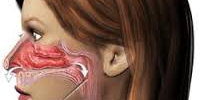Postnasal discharge or postnasal drip ( kaira ) is a common symptom.
Causes of Post-nasal Discharge
The inside lining of the nose produces large amounts of mucus to clean the nose, trap foreign particles (e.g., dust), and to fight infection. Post-nasal drip can be caused by various medical conditions including sinusitis (inflammation of the sinuses), viral infections such as the common cold, rhinitis (a runny nose that may be acute or chronic), allergies, or bacterial infections. In some cases, post-nasal drip can be caused by reflux, or gastroesophageal reflux disease.
Symptoms and Complications of Post-nasal Drip
People who experience post-nasal drip often describe a feeling of mucus dripping at the back of the throat. This may lead to frequent throat clearing, sore throat, and coughing. Since post-nasal drip is a symptom of another condition, other symptoms may be present that are linked to whatever’s causing the problem. When allergies are responsible for post-nasal drip, many people experience teary eyes, itchiness of the nose and eyes, and headaches. If you have asthma, the post-nasal drip may make breathing even more difficult.
Other symptoms associated with post-nasal drip may include bad breath, stuffy nose, hoarse voice, or coughing.
Diagnosis
The first step is to figure out what’s causing the post-nasal drip. Your doctor will help with this by asking questions about your symptoms and examining your ears, nose, and throat. Your doctor will want to know if you have any allergy symptoms or if you have symptoms of an infection (e.g., fever). In some cases, other tests (e.g., X-rays) may be needed to determine the cause.
The type of mucus in your nose can reveal a lot about possible causes of nasal drip. If the mucus is clear, a common cold or allergies are most likely. If it is thick and has a yellow or green tinge, a bacterial infection may have developed
Treating and Preventing Post-nasal Drip
The treatment of post-nasal drip depends on its cause.
If your doctor determines that an infection is causing post-nasal drip, the infection will most likely be caused by a virus and antibiotics are not required. However, decongestants may help a stuffy nose and pain relievers can be used to help with pain. Sometimes, bacterial infections can occur and antibiotics may be prescribed.
Allergies a cause of post-nasal drip,over-the counter antihistamines (e.g., loratadine, desloratadine, cetirizine, fexofenadine) can be used to help with symptoms. Talk to your doctor or pharmacist before starting an antihistamine. Your doctor may also prescribe a corticosteroid nasal spray
**********************************************************************************************
* Dr Chohan’s ENT, Rafay Mall (1st floor), Peshawar Road Rawalpindi. 03315680471 , 03145118532
- Timing:
- Professor Brig (r) Dr Arshad Chohan MCPS, FICS, FCPS 11 am – 6 pm daily except Sunday
Professor Brig (r) Dr Amir Sabih Haidri, MCPS, FCPS 6.30 pm – 9 pm daily except Sunday & Monday
- Professor Brig (r) Dr Arshad Chohan MCPS, FICS, FCPS 11 am – 6 pm daily except Sunday
Website: www.entspecialists.pk

